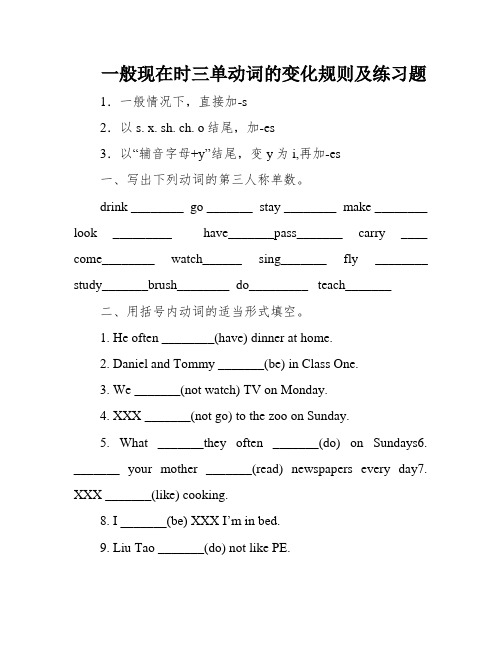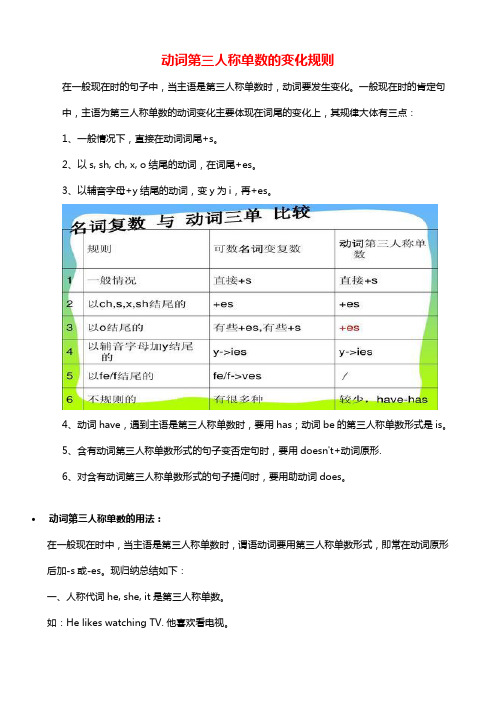一般现在时 动词三单
动词现三单变化

名词的复数变化规律一般现在时主语单三人称时的动词变化①在一般现在时中,当主语为第三人称单数时,动词要用“s”型(即第三人称单数形式)。
②所谓动词“s”型的构成,可按名词变复数的规则来记,即:i)在动词尾直接加s。
如:play—plays,want—wants,work—works,know—knows,help—helps,get—getsii)以字母s、x、ch或o结尾的动词加-es;如:guess—guesses,fix—fixes,teach—teaches,brush—brushes,go—goes,do—does,watch —watches,catch—catchesiii)以辅音字母+y结尾的动词,先变y为i,再加-es。
如:study—studies,carry—carries,fly—flies,worry—worries③④强调如何将主语是第三人称单数的肯定句变为否定和疑问句。
现举例说明(用划线部分来说明顺口溜):1)His mother works in a factory.His mother doesn’t work in a factory.Does his mother work in a factory?2)Mr Li teaches us English.Mr Li doesn’t teach us English.Does Mr Li teach you English?3)My brother studies maths well.My brother doesn't study maths well.Does your brother study maths well?。
一般现在时三单动词的变化规则及练习题

一般现在时三单动词的变化规则及练习题1.一般情况下,直接加-s2.以s. x. sh. ch. o结尾,加-es3.以“辅音字母+y”结尾,变y为i,再加-es一、写出下列动词的第三人称单数。
drink ________ go _______ stay ________ make ________ look _________ have_______pass_______ carry ____ come________ watch______ sing_______ fly ________ study_______brush________ do_________ teach_______二、用括号内动词的适当形式填空。
1. He often ________(have) dinner at home.2. Daniel and Tommy _______(be) in Class One.3. We _______(not watch) TV on Monday.4. XXX _______(not go) to the zoo on Sunday.5. What _______they often _______(do) on Sundays6. _______ your mother _______(read) newspapers every day7. XXX _______(like) cooking.8. I _______(be) XXX I’m in bed.9. Liu Tao _______(do) not like PE.10. The child often _______(watch) TV in the evening.11. Doyou ________(like)_________(run)12. Doeshe_________(like)_________(jump)13. Does Nancy_________(grow)flowers on Saturdayteachers________(like)___________(dance).15. The teacher________(like)____________(dance).16. The students___________(speak) English in class.17. The student_________(speak) Chinese after class.18. Let's___________and play football . ( go )19. He_____________ like swimming . ( not )20. I'm sorry ____________that . ( hear )3、依照请求改写句子1. XXX.(改为否定句)__________________________________________________ _2. I do XXX.(改成普通疑问句,作否认回覆)________________________________________________3. XXX.(改成普通疑问句,做一定回覆)__________________________________________________ _____4. XXX(改成普通疑问句,作否认回覆)___________________________________________________ _____5. We go to school on Sundays.(改成否认句)__________________________________________________ _____四.用所给的人称改写句子。
动词第三人称单数的变化规则

动词第三人称单数的变化规则在一般现在时的句子中,当主语是第三人称单数时,动词要发生变化。
一般现在时的肯定句中,主语为第三人称单数的动词变化主要体现在词尾的变化上,其规律大体有三点:1、一般情况下,直接在动词词尾+s。
2、以s, sh, ch, x, o结尾的动词,在词尾+es。
3、以辅音字母+y结尾的动词,变y为i,再+es。
4、动词have,遇到主语是第三人称单数时,要用has;动词be的第三人称单数形式是is。
5、含有动词第三人称单数形式的句子变否定句时,要用doesn't+动词原形.6、对含有动词第三人称单数形式的句子提问时,要用助动词does。
•动词第三人称单数的用法:在一般现在时中,当主语是第三人称单数时,谓语动词要用第三人称单数形式,即常在动词原形后加-s或-es。
现归纳总结如下:一、人称代词he, she, it是第三人称单数。
如:He likes watching TV. 他喜欢看电视。
She has lunch at twelve. 她十二点吃午餐。
It looks like a cat. 它看起来像只猫。
二、单个人名、地名或称呼作主语;是第三人称单数。
如:①HanMei looks like her mother. 韩梅看起来像她的母亲。
②Beijing is in China. 北京在中国。
③UncleWang often makes cakes. 王叔叔经常做蛋糕。
三、单数可数名词或"this/that/the+单数可数名词"作主语时,是第三人称单数。
如:①A horse is a useful animal.马是有用的动物。
②This book is yours.这本书是你的。
③That car is red.那辆小汽车是红色的。
④The cat is Lucy's.这只猫是露茜的。
四、不定代词someone, somebody, nobody, everything, something等及指示代词this, that 作主语时,是第三人称单数。
(完整版)小学英语一般现在时三单动词的变化规则及练习题

一般现在时三单动词的变化规则及练习题1.一般情况下,直接加-s 2.以s. x. sh. ch. o结尾,加-es 3.以“辅音字母+y”结尾,变y为i,再加-es一、写出下列动词的第三人称单数drink ________ go _______ stay ________ make ________ look _________ have_______ pass_______ carry ____ come________ watch______sing_______ fly ________ study_______ brush________ do_________ teach_______二、用括号内动词的适当形式填空。
1. He often ________(have) dinner at home.2. Daniel and Tommy_______(be) in Class One. 3. We _______(not watch) TV on Monday. 4. Nick _______(not go) to the zoo on Sunday.5. What _______they often _______(do) on Sundays?6. _______ your mother _______(read) newspapers every day?7. Mike _______(like) cooking. 8. I _______(be) ill. I’m in bed. 9. Liu Tao _______(do) not like PE. 10. The child often_______(watch) TV in the evening.三、按照要求改写句子1. He watches TV every evening.(改为否定句)___________________________________________________2. I do my homework every day.(改为一般疑问句,作否定回答) ________________________________________________3. She likes books.(改为一般疑问句,做肯定回答)_______________________________________________________4. Amy likes playing computer games.(改为一般疑问句,作否定回答)________________________________________________________5. We go to school on Sundays.(改为否定句)_______________________________________________________四、改错(划出错误的地方,将正确的写在横线上)1. Is your brother like English? __________________2. Does he likes swimming? __________________3. He likes play games. __________________4. Shedon’tdo her homework on Sundays. _________________五、把句子补充完整。
动词三单式变化规则

动词三单式变化规则
嘿,朋友们!咱今天来聊聊动词三单式变化规则呀!你知道一般现在时里,当主语是第三人称单数时,动词得有啥变化不?比如说,He likes music. 这里的 like 就加了 s 呢!哎呀,这就好像一个小魔术一样,动词就得乖乖变个样!
一般来说呀,大部分动词直接在后面加 s 就行啦!就像 Mary goes to school every day. 这里的 go 就变成了 goes 啦!
还有哦,如果动词是以 s、x、ch、sh 结尾的,那就要加 es 哦!举个例子呗,She watches TV in the evening. 你看,watch 就加上 es 啦!是不是很有意思呀?
要是动词是以辅音字母加 y 结尾的,那得把 y 变成 i 再加 es 呢!比如He studies hard. 这里的 study 就这么变啦!
咱可别小瞧了这动词三单式变化规则呀,这在英语里可重要啦!掌握了它,咱说英语才能更溜呀!大家可得好好记住哟!。
一般现在时语法三单精讲

一般现在时精讲一、什么是一般现在时:一般现在时:表示经常性的事情,经常性的动作或一般性事实。
结构:主语+动词(单数或者复数根据主语决定)二、什么时候用一般现在时:1. 当句子表示客观真理,客观存在,科学事实时:The earth moves around the sun.Shanghai lies in the east of China.2. 当句子是名言警句时:Pride goes before a fall.骄者必败。
3. 当句子表示现在时刻的状态、能力、性格、个性:I don't want so much.Ann Wang writes good English but does not speak well.4. 当句子中出现了时间标志语:(1)表示频度的副词或词组always ,often, usually, sometimes,once a year等(2)every day, in the morning, every year,at …在几点钟等时间状语三、一般现在时怎么用:当句子符合上面任何一种情况,则句子采用一般现在时,这时候动词要开始改变啦,兵分2路改变:大部队一路:当主语是第三人称单数时:1、动词变成相应的第三人称单数形式(动词的复数形式)2、肯定句:主语+动词复数+其它3、否定句:主语+doesn't+动词原形+其它(其中的does代表动词的复数,不代表没有任何意义)4、一般疑问句:Does+主语+动词原形+其它5、肯定回答:Yes,主语+does6、否定回答:No,主语+doesn't7、特殊疑问句:特殊疑问词+一般疑问句(一般疑问句中用does)小分队一路:当主语不是第三人称单数时:1、动词不变成相应的第三人称单数形式(动词不用变成复数)2、肯定句:主语+动词原形+其它3、否定句:主语+don't+动词原形+其它(其中的do代表动词的单数,不代表没有任何意义)4、一般疑问句:Do+主语+动词原形+其它5、肯定回答:Yes,主语+do6、否定回答:No,主语+don't7、特殊疑问句:特殊疑问词+一般疑问句(一般疑问句中用do)总结起来就是这样的四、那么,动词如何变成复数呢:三单变化:(1)直接在动词词尾加-s.ask---asks work---works get---gets stay---stays(2)以字母s, x, ch, sh或o结尾的动词,在词尾直接加-es.watch---watches wish---wishes fix---fixes do---doesgo---goes pass---passes(3)以“辅音字母加- y”结尾的动词,要先变y为i再加-es.try---tries study---studies cry---cries fly---flies一、考点/易错点1动词变形有误1 He __ football very well.2 Danny __ to school at 7:10.答案:1 plays 2 goes plaies, gos解析:1以加y结尾的动词变单三人称形式才能把y换成i再加es;2与名词变复数不同,变单三人称形式以o结尾的词要加es.考点/易错点2对主语判断有误例:This book __mine答案: is解析: 书是属于“它(it)”的范围,是无生命的它,所以也是三单。
初中一般现在时与三单动词的变化规则

一般现在时1.概念:经常、反复发生的动作或行为及现在的某种状况。
2.时间状语:always,usually,often,sometimes,every week(day,year,month…),once a week, on Sundays,3.基本结构:动词原形/第三人称单数形式(如主语为第三人称单数,动词上要改为第三人称单数形式)4.否定形式:am/is/are+not; 谓语动词若为动词,则在其前加don't,如主语为第三人称单数,则用doesn't,同时还原行为动词。
5.一般疑问句:把be动词放于句首;用助动词do提问,如主语为第三人称单数,则用does,同时,还原行为动词。
三单动词的变化规则1.一般情况下,直接加-s如:play—plays, want—wants, work—works, know—knows, help —helps,get—gets2.以s. x. sh. ch. o结尾,加-es如:guess—guesses, fix—fixes, teach—teaches, brush—brushes, go —goes,do—does,watch—watches,catch—catches3.以“辅音字母+y”结尾,变y为i, 再加-es如:study—studies,carry—carries,fly—flies,worry—worries一般现在时用法专练:一、写出下列动词的第三人称单数drink ________ go _______ stay ________ make ________look _________ have_______ pass_______ carry ____come________ watch______ plant_______ fly ________study_______ brush________ do_________ teach_______catch _________ wash_________ like________have______say_________ learn ________ eat________ read_________ sing_______二、用括号内动词的适当形式填空。
一般现在时语法三单精讲

一般现在时精讲一、什么是一般现在时:一般现在时:表示经常性的事情;经常性的动作或一般性事实..结构:主语+动词单数或者复数根据主语决定二、什么时候用一般现在时:1. 当句子表示客观真理;客观存在;科学事实时:The earth moves around the sun.Shanghai lies in the east of China.2. 当句子是名言警句时:Pride goes before a fall. 骄者必败..3. 当句子表示现在时刻的状态、能力、性格、个性:I don't want so much.Ann Wang writes good English but does not speak well.4. 当句子中出现了时间标志语:1表示频度的副词或词组always ;often; usually; sometimes;once a year等2every day; in the morning; every year;at …在几点钟等时间状语三、一般现在时怎么用:当句子符合上面任何一种情况;则句子采用一般现在时;这时候动词要开始改变啦;兵分2路改变:大部队一路:当主语是第三人称单数时:1、动词变成相应的第三人称单数形式动词的复数形式2、肯定句:主语+动词复数+其它3、否定句:主语+doesn't+动词原形+其它其中的does代表动词的复数;不代表没有任何意义4、一般疑问句:Does+主语+动词原形+其它5、肯定回答:Yes;主语+does6、否定回答:No;主语+doesn't7、特殊疑问句:特殊疑问词+一般疑问句一般疑问句中用does小分队一路:当主语不是第三人称单数时:1、动词不变成相应的第三人称单数形式动词不用变成复数2、肯定句:主语+动词原形+其它3、否定句:主语+don't+动词原形+其它其中的do代表动词的单数;不代表没有任何意义4、一般疑问句:Do+主语+动词原形+其它5、肯定回答:Yes;主语+do6、否定回答:No;主语+don't7、特殊疑问句:特殊疑问词+一般疑问句一般疑问句中用do总结起来就是这样的四、那么;动词如何变成复数呢:三单变化:1直接在动词词尾加-s.ask---asks work---works get---gets stay---stays2以字母s; x; ch; sh或o结尾的动词;在词尾直接加-es. watch---watches wish---wishes fix---fixes do---does go---goes pass---passes3以“辅音字母加 - y”结尾的动词;要先变y为i再加-es. try---tries study---studies cry---cries fly---flies一般现在时专项练习一、考点/易错点1动词变形有误1 He __ football very well.2 Danny __ to school at 7:10.答案:1 plays 2 goes plaies; gos解析:1以加y结尾的动词变单三人称形式才能把y换成i再加es;2与名词变复数不同;变单三人称形式以o结尾的词要加es.考点/易错点2对主语判断有误例: This book __mine答案: is解析: 书是属于“它it”的范围;是无生命的它;所以也是三单..二、例题精析We often___________play in the playground.A. playB. playsC. plaiesD.playedA主语是”we”;“often”是频率副词;句子用一般现在时三、实践运用基础1. The picture _______ nice.A. looksB. is lookedC. lookD. is looking答案:A解析:主语是第三人称单数;谓语动词用三单形式2. I ________TV once a week.A. watchesB. watchsC. watchD.watched答案:C解析:once a week一周一次;表示频率;动词用一般现在时..主语是第一人称;动词用原形..巩固1. John always ______ others.A. helpB. helpingC. helpsD. to help答案:C解析:主语是第三人称单数;谓语动词用三单形式2. The teacher told us that the sun ____in the east.A.risesB. roseC. raisesD.raised答案:A解析:太阳从东方升起;这是客观事实;用一般现在时;动词要用单三式拔高1. The students will go to the Summer Palace if it _____ tomorrow.A. don't rainB. doesn't rainC. won't rain答案:B..2. You should visit this part of the country when ___.A. spring will comB. spring comesC. It has been springD. It will be spring答案:B解析:when引导的时间;从句一般时态;主句用态或..所以选B专项练习:写出下列动词的相应形式:1. 第三人称单数: wash_________ match _______guess______study______ finish_________ go________ snow______ carry_________ 2.写出下列动词的过去式:stop______ see________ drive________let_______ carry______ keep_____ join______ find_______ think________ teach______ catch______3. 写出下列动词的现在分词形式: stay_______ begin______forget_______forget______ lie________ die _______ run_______ prefer______give________ring_______ dance______ hope_______II. 用所给动词的适当形式填空:√1.I ________write to you as soon as I _______get to London. √2. He doesn’t feel well and ____________not eat any food this morning.√3. He ______ not _______see me come in; for he ___________read something with great interest.√4. I _________let you have the book as soon as I _________finish it.√5. While we ________wait for our teacher; a little boy ________run up to us.6. Don’t make a noise. Grandpa __________sleep.7.It’s seven now;Tom’s family__________watch TV.√8. It ________take me two hours to finish my homework last night. √9. What ______ your mother _______do at eight yesterday evening She _______wash clothes.10. _______ it ______ rain when school was over yesterday11. What _______do _______ tomorrow We ________ play football.12. There ________ be a football match on TV this evening.13. They said they ________ visit the Great Wall the next summer holiday.√14. Who _______ dance the best in your class15. Will you come if he _____________ not come√16. The teacher told us the earth __________ move round the sun.17. They _______ have a party in the garden if it ________ not rain tomorrow.18 She ________ buy a sweater yesterday.19. I don’t know if Mr.Wang ______ go to Shanghai tomorrow. If he _____ go; I ______ ask him _______ take some books to my daughter; because she _______ study there.III单项选择:1.The students will go to the Summer Palace if it _____ tomorrow.A.don’t rainB. doesn’t rainC. won’t ra in2. There _____ an English film next week.A. will haveB. is going to haveC. is going to beD. was going to be3. The picture _______ nice.A. looksB. is lookedC. lookD. is looking4. She ______ down and soon fell asleep.A. liveB. lainC. laidD. lay5. They _____ the office at nine yesterday morning.A. reached toB. arrivedC. wentD. get to6. We shall go to Shanghai on business before you _____ back next week.A. wil comeB. cameC. would comeD. come7. Don’t smoke until the plane ______ off.A. takesB. tookC. was takenD. is take8. I saw her ____ the room this morning.A. to enterB. enteredC. enterD. enters9.the teacher asked us ______ to school on time.A. to comeB. comingC. comeD. comes10. John is always ______ others.A. helpB. helpingC. helpsD. to help11. He told us ______ at eight.A. workingB. to workC. workD. worked12. You’d better ______ at home and ______ your homework.A. to stay; doB. stay; doC. to stay; to doD. stay; to do13. He sat down ______ a rest.A. havingB. haveC. to haveD. had14. Uncle Wang knows _______ a washing machine.A. how to makeB. to makeC. how makingD. what to make15. Jim decided _______ Polly to Ling Feng when he was back toEngland.A. to leaveB. leftC. leavingD. leave。
- 1、下载文档前请自行甄别文档内容的完整性,平台不提供额外的编辑、内容补充、找答案等附加服务。
- 2、"仅部分预览"的文档,不可在线预览部分如存在完整性等问题,可反馈申请退款(可完整预览的文档不适用该条件!)。
- 3、如文档侵犯您的权益,请联系客服反馈,我们会尽快为您处理(人工客服工作时间:9:00-18:30)。
一般现在时的句子结构
1、当句子表状态说明主语是什么或怎么样时
句子结构为:主+BE动词(am, is, are)+其他.
否定式为:主+BE动词+not+其他.
疑问句为:BE+主+其他?
例: The twin sisters are from America.
The twin sisters are not from America.
Are the twins from America?
2、当谓语由实义动词充当,主语不是第三人称单数时,
句子结构为:主语+动词原形+其它.
否定式为:主语+don't+动词原形+其它.
疑问句为:Do+主语+动词原形+其它?
例: We speak Chinese.
They don't speak Chinese.
Do you speak Chinese?
3、当主语是第三人称单数时:
句子结构为 主语+动词(词尾加s或es)+其它.
否定式为:主语+doesn't+动词原形+其它.
疑问句式:Does+主语+动词原形+其它。
动词三单变化方法
1. 一般情况下在动词后面加 s。例如 read---reads,
write---writes, like---likes, take---takes, see---sees,
say---says, help---helps 等等。
2. 遇到以 -ch, -sh, -s, -x, -o 结尾的动词,加 es。例如
teaches, washes, guesses, fixes, goes, does 等。
3. 遇到以“辅音字母+y” 结尾的动词,将 y 改为 i 后加 es。
例如 try---tries, study---studies, carry---carries 等。
4. 个别动词有特殊的变化形式:have---has, be---is。
